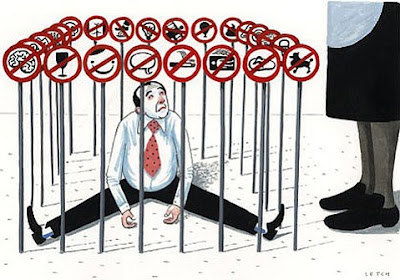Should The Church Contribute To The Nanny State?
A proviso to this post. When I talk
about Law I am not talking about the law’s that are set up by governments
rather, I am talking about what people believe the Bible says on how we should live.
Jesus encountered many groups of people
during his ministry. However, it was the Pharisees that prided themselves on
living a life that reflected the Torah. For them to receive the Messiah they
felt they had to live a Torah based life. This however, extended outside of their
own personal piety and was enforced in the larger social unit. They
had people who would make sure that no offences were being committed and
if they were, punishment would be dished out accordingly. One of their
main areas of contention was the keeping of the Sabbath. The day had to be a
non-work day. However, instead of becoming about keeping the law in order
to receive its benefits, it became about how do we change manipulate the
law. How do we stop ourselves from being caught?
An example of this is as McGriff says:
" One law, for example, ordained that a devout Jew could not
travel more than a short distance on the Sabbath. However, if a man needed to
make a trip he could leave a small chair under a bush the allowable distance
from his home, then perhaps some eating utensils a similar distance, and so
forth, until these various items reached the desired destination. On the
Sabbath, the man could walk the allowable distance to his chair, sit a while
and establish residence, then walk to the utensils and eat some food,
once more establishing residence, and so forth. This way, the man could circumvent the
law."
This is what makes Jesus so interesting. He knows
people have broken the laws (the women caught in adultery, Zacchaeus, the
eating of the grain in the field, etc.) yet in these moments he tells people
not how bad they are but rather tells them that they need to reinterpret the
law. The law for Jesus should always bring life. It should never be a case that
it is used as a form of oppression. Where we wiggle out of it by
looking for loopholes. When we look for loopholes we are in essence, not
living a pietistic life but rather a legalistic life.
In the middle ages, there was a push for a more
pietistic life. The Catholic Church during this period became an engaging force
for social cohesion. People fell under the control of the supreme leader
"The Pope" and devotion was found in the works that people did. I do
realise that, that system ultimately imploded on itself and caused
the reformation. However, Luther and Calvin still held the idea of piety is
strong regard. This was a vital cog in the reformation wheel.
The Moravians relied heavily on piety. This
understanding was to influence John Wesley who developed a piety based form of
Anglicanism called Methodism. Wesley encouraged people to live lives of piety
that changed the face of England. Central to his idea of piety was the
formation of groups of accountability. People were held accountable for
their actions.
I do think that current Church history has also
been based on piety. Various groups are encouraging their communities to live
pietistic lives. Lives that show God based on scripture. Part of the
various "conservative" movements have been tailored to this
understanding. However, I also think that "progressive" movements
have had a form of pietism as well. They have tried to live lives that have
reflected what they feel reflected God and scripture.
I guess what I am trying to say is that Pietism is
a various personal thing. It comes down to the individual as to how
we understand and interpret God.
Now part of me is ringing with the dissonance of understanding
that we need laws to govern us otherwise it becomes a free for all. A big
question is where do you draw the line? How do you hold people
accountable?
I think for me relationship is key. I think what
Jesus, the early Church, the Catholic Church, the Reformers, the Moravians, the
Methodists, the Progressives, and the Conservatives were/are trying to achieve is
not the nanny state. I don't think that it is helpful when we become so
dogmatic that we lose sight of the reason for the law.
Life abundant.
A life that makes humans the best that they can
be. I think that sin could also be classified as not being present to the full
human experience. Not being able to see why you need to take a Sabbath. Not
seeing why living a certain way is not helpful. But also, not realising why we
need community. A community that shows how our lives cause dissonance when we
live out of sync with our common values. A community that hurts by the actions
that are before them. I also think that a community can sin against a person.
They can also stop a person from being fully alive.
So... I guess this a long-winded way of
me saying that no we don't want a nanny state in our church but we do want
close relationships. Relationships that bring life to each other. Relationships
that protect all members. So, that we live in with the law not in a way that
brings oppression and loophole digging but rather brings us closer to the full
human experience.



Comments
Post a Comment